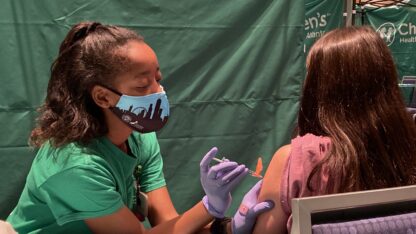This story was originally published at Georgia Health News.
The five support centers for people with mental health problems provide a good financial return for Georgia, their leaders say.
The centers, funded by the state, prevent hospitalizations in state facilities, which can cost $600 a day, and offer other services for thousands of Georgians, says the Georgia Mental Health Consumer Network.
The peer support, wellness and respite centers are run by “peer specialists’’ — people who have experienced such mental health crises and are trained to help others with similar difficulties.
“They provide a safe place for people to receive support without the burden of hospitalization,’’ says Chris Johnson of the Mental Health Network, who is a peer specialist.
But now the five centers are in danger of closing due to a $1 million cut in the budget of the Department of Behavioral Health and Developmental Disabilities.
It’s just one of a myriad of troubling reductions in mental health, public health and other health areas in the state budget for the upcoming fiscal year, expected to be finalized and approved this week.
As a result of the economic calamity created by COVID-19, the state budget is hurtling toward sizable spending reductions in vital areas – an average of 11 percent across state agencies, or $2.6 billion. But the worst time to cut such programs, experts say, is during a public health crisis.
The virus, meanwhile, is surging in the state, up by 1,800 new cases between Friday and Saturday. That’s the highest one-day increase so far in Georgia.
It’s a time when public health and mental health services are needed more than ever.
“I know this is not the budget that many of you expected or hoped to have this year,” Senate Appropriations Committee Chairman Blake Tillery (R-Vidalia) told his colleagues Friday at the beginning of the debate on the Senate’s budget bill.
Health care organizations, including four physician groups, have pushed the longtime idea of raising the state tobacco tax. Georgia’s levy, at 37 cents a pack, trails only those in Missouri and Virginia.
Raising the tobacco tax to the national average, $1.81, and taxing vaping products would raise up to $600 million per year annually, according to an estimate by the Georgia Budget and Policy Institute, a think tank. That move would erase the pending cuts across the major health agencies, says Laura Harker of GPBI.
The tobacco tax increase looked all but dead after House Speaker David Ralston (R-Blue Ridge) voiced his opposition. But the Senate Finance Committee, led by Sen. Chuck Hufstetler, a Rome Republican and a longtime proponent of raising the levy, added a provision to a bill late last week that would raise the tax to $1.35 a pack.
Still, its prospects are uncertain at best, with opposition from Ralston and, reportedly, from Gov. Brian Kemp.
“Is there not more we could do as a state to raise revenue and make a bigger pie rather than cutting in the budget?” asked Sen. Nan. Orrock, an Atlanta Democrat, during the budget debate Friday.
As the state moves to reduce spending, it’s not only looking to cut back on some health programs but also planning unpaid furloughs for some state employees who deliver such services.
Behavioral Health/Developmental Disabilities
The pandemic has created a new strain on the mental health of Americans.
A Kaiser Family Foundation poll found more than half of Americans — 56 percent — reported that worry or stress related to the outbreak had led to at least one negative mental health effect.
That’s why the availability of services is so important now.
“Georgia is at the low end when it comes to funding mental health,’’ says Sherry Jenkins Tucker of the Mental Health Consumer Network, who calls the budget cut for the recovery centers “devastating.’’
State funding for Addiction Recovery Support Centers are taking a hit, too. Autism programs will see a funding cut, as will a program for children born with fetal alcohol syndrome.
Millions are being chopped from a housing voucher program for people with serious mental illness. That’s an area viewed by the U.S. Department of Justice as a weakness in Georgia’s compliance with a settlement agreement with the federal agency.
Family support services for people with disabilities is getting a significant reduction as well.
“We think it is vital to compare how we leverage federal funds to support people with disabilities compared to our neighboring states and the nation,’’ says the Georgia Council of Developmental Disabilities. “When you look at the numbers, you will see that Georgia is 50th in the nation and last in the Southeast in leveraging federal match to support people with disabilities.’’
Public Health
One program spared from the budget ax was Grady Health System’s HIV/AIDS program.
The Ponce de Leon Center is the state’s biggest program serving these patients, and one of the biggest in the nation. It was facing the elimination of a $1.5 million contract, which would have led to the loss of federal funding as well.
While the Ponce de Leon center got good news, Public Health departments across the state were not so fortunate.
The grants to these agencies, under the Senate budget, will drop by nearly $14 million. “I’m especially concerned about smaller counties that don’t have the ability to raise revenue,’’ says Harker of GPBI.
Cancer research will take a funding cut, as will the Georgia Poison Center.
And programs to prevent maternal mortality – a longtime problem in Georgia – will not be funded as well as envisioned early in the legislative session.
A bill that would have extended Medicaid coverage for new mothers is now moving forward but without sufficient funding attached.
“We appreciate the difficult position of the Legislature right now, but addressing our dire maternal mortality rate and racial inequities for black mothers has to remain a priority,’’ says Elise Blasingame of the Healthy Mothers, Healthy Babies Coalition of Georgia. “We cannot afford to move backwards on this.”
Grants to medical schools — Mercer, Morehouse and PCOM’s South Georgia location — will be slashed, at a time when Georgia already has a health care professional shortage.
“Obviously, really difficult decisions have to be made regarding the state budget,’’ says Polly McKinney of the advocacy group Voices for Georgia’s Children. “It is disconcerting, however, to find so many cuts to programs addressing infant, child and youth health. Reduction of funds for youth crisis respite homes, youth clubhouses and evidence-based therapies for children under [Juvenile Justice] supervision, as well as furloughs for those who care for and protect children in the state are worrying.’’
McKinney sees some hope in possible funding for school-based mental health services, and the possibility of extending Medicaid coverage for new mothers. “I just hope that our leaders remember that cuts to child and youth services usually result in cuts to the success and productivity of Georgia’s future workforce,’’ she says.










